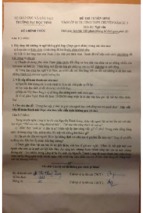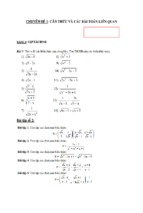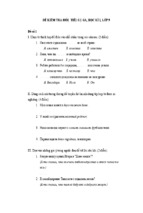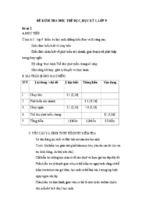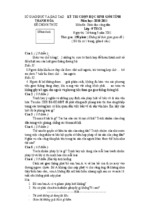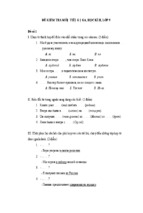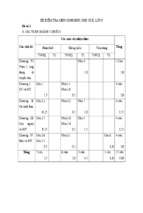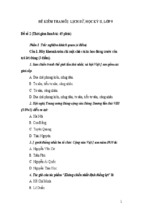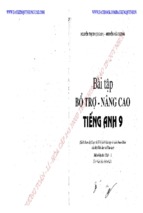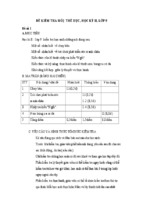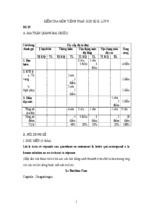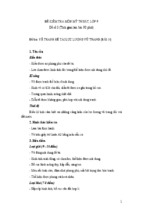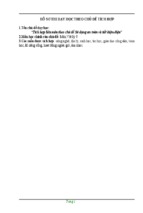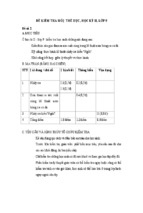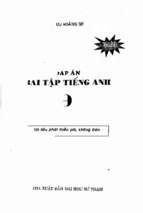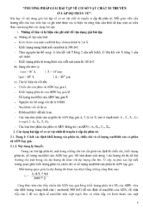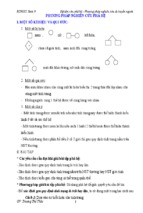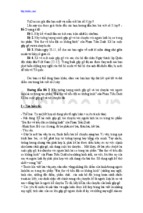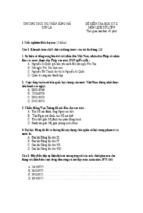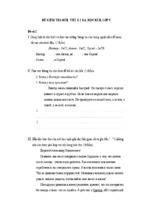Tóm lược nội dung kiến thức tiếng anh cơ bản ôn thi vào 10
Tran Nguyen Han High School
Néi dung kiÕn thøc c¬ b¶n «n thi vµo 10
I/ Chủ đề 1: c¸c th× trong tiÕng anh – tenses
1) The present simple ( Th× hiện tại thường )
a. Form (Cấu tạo)
S + am/is/are +....
S + V/ V(s /es)
b. Usage (c¸ch dïng)
Th× hiện tại thường được dïng để:
- Diễn tả sự việc thường sảy ra ở giai đoạn hiện tại:
Eg:
I go to work at 7.30
She works in a bank
He goes to school at 6.30
- DiÔn t¶ nh÷ng thãi quen, tËp qu¸n hay ®Æc tÝnh :
Eg:
He often plays badminton everyday
Mr Bott drinks strong tea after meals.
- DiÔn t¶ mét ch©n lÝ hay mét sù thËt hiÓn nhiªn:
Eg:
The sun rises in the east and sets in the west.
The earth goes round the sun
2) The present continuous (Th× hiện tại tiếp diễn) progressive
a. Form (Cấu tạo)
S + am/is/are + V- ing + O (object)
Note: read – reading
Play – playing
Go – going
Eg: Run – running , sit – sitting, swim – swimming
Have – having ,
Lie - lying
Die - dying
b. Usage: Thì hiện tại tiếp diễn dùng để:
- Chỉ một hành động, sự việc đang sảy ra tại thời điểm nói
1
Composed by : Hoµng ViÖt C−êng
Tran Nguyen Han High School
Eg:
We are studying / learning English
She is reading a book
It is raining heavily
- Chỉ một sự thay đổi đang sảy ra xung quanh thời điểm nói
Eg:
The population of Vietnam is increasing very fast
The earth is getting warmer and warmer
- Chỉ một hành động được lên kế hoạch từ trước cho tương lai
Eg:
She is buying a new car next week
* now, at the moment, at present, right now
3) The past simple (Thì qua khứ thường)
a. Form (Cấu tạo)
S + was / were +.....
S + was / were + not (wasn't/weren't)
Was / were + S +.....?
Yes, S + was/were
No, S + wasn't/weren't
S + V + ed (V2) + (O)
S + did + not + V
(didn't)
Did + S + V? - Yes, S + did / No, S + didn't
She went to the theatre last night
She didn't go .............................
Did you go to the theatre last night? – Yes, she did
Eg: like – liked, stay – stayed, play – played.......
See – saw, go – went , have – had , come – came ,
write – wrote, buy – bought, ......
b. Usage (C¸ch dïng)
Th× qu¸ khø th−êng ®−îc dïng ®Ó
- DiÔn t¶ mét hµnh ®éng, sù viÖc ®· x¶y ra vµ kÕt thóc t¹i mét thêi ®iÓm x¸c ®Þnh trong qóa khø ( th−êng ®i
kÌm víi c¸c tr¹ng tõ:
yesterday, last night, last week, last year, ago, in ....)
Eg:
The football match finished at 5.00 yesterday
The football match didn't finish at 5.00 ........
2
Composed by : Hoµng ViÖt C−êng
Tran Nguyen Han High School
Did the football match finish at ..............? – No, it didn't
The boy came to see his parents last week
They boy didn't come to ........
Did the boy come to see....? – Yes, he did
- DiÔn t¶ mét lo¹t c¸c hµnh ®éng nèi tiÕp nhau trong qu¸ khø
Eg:
He walked into the room, turned on the light and saw a terrible mess.
4) The past continuous (Th× qu¸ khø tiÕp diÔn)
a. Form:
S + was/were + V- ing + (O)
S + wasn't/weren't + V-ing + O
Was / were + S + V-ing + O?
Yes, S + was/ were
No, S + wasn't/weren't
b. Usage:
- Th× qu¸ khø tiÕp diÔn dïng ®Ó diÔn t¶ nh÷ng hµnh ®éng, sù viÖc ®ang x¶y ra t¹i mét thêi ®iÓm x¸c ®Þnh trong
qu¸ khø
Eg:
They were singing in the room at 10 p.m yesterday
They weren't singing in the room at 10................................
Were they singing in the room at......? – Yes, they were
She was watching TV at 8.00 last night
She wasn't watching TV.......
Was she watching TV at...? – No, she wasn't
Note:
Cã thÓ dïng
when hoÆc while víi th× qu¸ khø tiÕp diÔn
- Dïng when trong tr−êng hîp khi cã mét hµnh ®éng ®ang x¶y ra th× mét hµnh ®éng kh¸c xen ngang. Chó ý
when th−êng ®øng ë mÖnh ®Ò víi th× qu¸ khø ®¬n.
Eg:
They were having dinner when I came home.
We were going home when it rained.
- Dïng while khi cã hai hµnh ®éng song song cïng x¶y ra t¹i mét thêi ®iÓm trong qu¸ khø.
Eg:
She was cooking while her husband was watching TV
The boy was playing tennis while his brother was playing football
3
Composed by : Hoµng ViÖt C−êng
Tran Nguyen Han High School
5) The present perfect (Th× hiÖn t¹i hoµn thµnh)
a. Form:
S + has/have + VPII + O
b. Usage: Th× hiÖn t¹i hoµn thµnh dïng ®Ó:
- DiÔn t¶ mét hµnh ®éng ®· x¶y ra t¹i mét thêi ®iÓm nµo ®ã trong qu¸ khø (kh«ng x¸c ®Þnh râ thêi ®iÓm) vµ
kÕt qu¶ cña hµnh ®éng cßn l−u l¹i ®Õn hiÖn t¹i.
Eg:
They have bought a new TV
The volleyball match has finished
- DiÔn t¶ mét hµnh ®éng b¾t ®Çu trong qu¸ khø, kÐo dµi ®Õn hiÖn t¹i vµ cã thÓ tiÕp tôc ë t−¬ng lai
Eg:
She has learnt English for five years.
- DiÔn t¶ sù viÖc sÏ hoµn thµnh ë t−¬ng lai; tr−íc mÖnh ®Ò th−êng cã : if, when, before, after, as soon as...
Eg:
Let’s have our meeting after we have had lunch.
* C¸ch dïng cña th× hiÖn t¹i hoµn thµnh víi mét sè tr¹ng tõ:
+ For: ChØ kho¶ng thêi gian hµnh ®éng thùc hiÖn ®−îc lµ bao l©u: for 2 years, for 10 minutes, for a long time,
....
Eg:
Nam has learnt English for 4 years.
We have lived here for 3 months.
+ Since: ChØ mèc thêi gian: since 2000, since Monday, since last summer...
Eg:
I have not seen her since last Spring
They have bought this flat since 2006
+ Just: ChØ hµnh ®éng míi x¶y ra ®−îc mét thêi gian ng¾n
Eg:
Mark has just finished his report
It has just started raining
+ Already: §−îc dïng ®Ó nhÊn m¹nh r»ng mét hµnh ®éng nµo ®ã ®· x¶y ra sím h¬n mong ®îi.
Eg:
Mike: Is Sarah going to phone you later?
Laura: No. She has already phoned me.
+ Yet: §−îc sö dông víi ®éng tõ phñ ®Þnh ®Ó nhÊn m¹nh r»ng hµnh ®éng nµo ®ã ch−a x¶y ra
Eg:
I haven’t finished my homework yet
4
Composed by : Hoµng ViÖt C−êng
Tran Nguyen Han High School
The post hasn’t arrived yet
+ Ever: th−êng ®−îc dïng ®Ó hái sù tr¶i nghiÖm trong c«ng viÖc hoÆc cuéc sèng
Eg:
Have you ever been to France?
Have you ever met President Bill Clinton?
+ Never: Nãi vÒ hµnh ®éng, sù viÖc ch−a tõng tr¶i qua. Never ®−îc dïng trong c©u kh¼ng ®Þnh nh−ng mang
nghÜa phñ ®Þnh.
Eg:
I have never been to Australia
I have never eaten this food
6) The present perfect continuous (Th× hiÖn t¹i hoµn thµnh tiÕp diÔn)
a. Form
S + have/has + been + V-ing + O
b. Usage: Th× hiÖn t¹i hoµn thµnh tiÕp diÔn dïng ®Ó nhÊn m¹nh mét hµnh ®éng ®· x¶y ra nh−ng cßn tiÕp tôc ë
hiÖn t¹i vµ cßn cã thÓ kÐo dµi ®Õn t−¬ng lai (Hµnh ®éng nµy mang tÝnh liªn tôc kh«ng cã sù gi¸n ®o¹n)
Eg:
I have been learning French for 5 years
I have been writing this report since 8.00 p.m
7) The past perfect (Th× qu¸ khø hoµn thµnh)
a. Form:
S + had + VpII + O
b. Usage: Th× qu¸ khø hoµn thµnh dïng ®Ó:
ChØ mét viÖc ®· hoµn thµnh tr−íc mét thêi gian nhÊt ®Þnh ë qu¸ khø. Th× qu¸ khø hoµn thµnh th−êng ®i kÌm
víi c¸c tõ chØ thêi gian nh−: after, before, when, by the time, as soon as, ever, already, never....
Eg:
When I got home, someone had taken my bicycle.
We didn’t need to queu because I had bought the tickets
8) The simple future (Th× t−¬ng lai th−êng)
a. Form:
S + will + V + O
b. Usage:Th× t−¬ng lai th−êng dïng ®Ó dù ®o¸n mét hµnh ®éng, sù viÖc nµo ®ã sÏ x¶y ra trong t−¬ng lai
Eg:
We will go to Thailand next week
It will rain tomorrow
* Note: So s¸nh th× t−¬ng lai th−êng víi c¸ch nãi t−¬ng lai gÇn
5
Composed by : Hoµng ViÖt C−êng
Tran Nguyen Han High School
- Th× t−¬ng lai th−êng (will) diÔn t¶ ý nghÜa t−¬ng lai nh−ng kh«ng kh¼ng ®Þnh ch¾c ch¾n hµnh ®éng sÏ x¶y ra,
nã chØ cã tÝnh chÊt dù ®o¸n
Eg:
The football match will occur tomorrow afternoon
- Dïng th× t−¬ng lai gÇn (going to) khi chóng ta muèn nãi hµnh ®éng nµo ®ã ®· ®−îc s¾p xÕp, lËp kÕ ho¹ch cô
thÓ vµ ch¾c ch¾n hµnh ®éng ®ã sÏ x¶y ra.
Eg:
It is going to rain tonight
I am going to visit Hue next Sunday
9) The future continuous (Th× t−¬ng lai tiÕp diÔn)
a. Form:
S + will + be + V-ing + O
b. Usage: Th× t−¬ng lai tiÕp diÔn diÔn t¶ hµnh ®éng sÏ ®ang x¶y ra t¹i mét thêi ®iÓm trong t−¬ng lai
Eg:
I will be waiting for you at 8.00 tomorrow morning at the station.
By the time next week, we will be living in Ho Chi Minh City.
Exercises
Put the verbs in brackets in the correct forms
1. We _____ (go) to the concert tonight.
2. I _____ (collect) stamps since I was a child.
3. John _____(repair) the TV set now. He _____(work) with it for three hours.
4. Mr Park _____(walk) home from work when he _____(see) the accident.
5. I can’t go with you because I _____(not, finish) my work.
6. I _____(not, see) him since we _____(leave) shool.
7. The car _____(be) ready for him by the time he _____(come) tomorrow.
8. We _____(walk) for three hours and we are very tired.
9. My clothes are not in my room. Someone _____(take) them away.
10. When we _____(take) our exams, we _____(go) on holiday.
11. I hope that by the end of the month, I _____(do) all the decorating.
12. After the guests _____(leave), she _____(go) back into the living room and _____(turn) off the light
13. They _____(learn) French from nine to ten in this room. Don’t let anyone disturb them.
14. I _____ (stay) in this hotel since April
15. The last train _____(leave) the station at 5.00 yesterday afternoon.
16. The children were frightened because it _____(get) dark.
17. She _____(say) that she had phoned me this morning, but it is now 12.30 and she _____(not, phone)
yet.
18. This time next month I _____(sit) on the beach.
19. The commitee _____(meet) next Monday.
6
Composed by : Hoµng ViÖt C−êng
Tran Nguyen Han High School
20. The police are trying _____(catch) the burglar.
21. By the end of the term I _____(read) all twelve volumes.
22. Don’t leave till you _____(talk) to the headmaster about the problem.
23. It was a fine day and the roads were crowded because a lots of people _____(rush) to the seaside.
24. She _____(drive) the same car since 2000.
25. The window – cleaner _____(come) at eight tomorrow.
26. I will get back as soon as I _____(get) through my business.
27. When I first met him he _____ (work) in a restaurent.
28. He _____(play) the guitar outside her house when someone opened the window and _____(throw) out
a bucket of water.
29. While we _____(fish), someone came to the house and left this note.
30. I have reminded you once; I _____(not, do) it again.
31. I am sure that you _____(like) our new house.
32. The population of the world _____(rise) very fast.
33. I _____(listen) to the music when the phone _____(ring).
34. John and Mary _____(not,talk) to each other since their quarrel yesterday.
35. I _____(find) it difficult to convince the ticket inspector that I _____(lose) my ticket.
36. I _____(hire) a typewriter and I will learn to type.
37. It is a serious injury but he _____(walk) again in six months.
38. By the end of this week her illness _____(cost) her $ 10,000.
39. After the phone _____(buzz) for a long while, the headmaster _____(answer) it.
40. I wish I _____(know) you need the book.I _____(can buy) it for you in Paris.
II/ Chủ đề 2: thÓ bÞ ®éng – the passive voice
1) Form:
S(noun/ pronoun) + be + VPII + (by agent)
Eg:
Active: They grow this fruit in very hot countries.
Passive: This fruit is grown in very hot countries.
2) Usage: ThÓ bÞ ®éng ®−îc dïng trong nh÷ng tr−êng hîp sau
- Khi chóng ta kh«ng biÕt ai ®· thùc hiÖn hµnh ®éng hoÆc kh«ng qu¸ quan träng ph¶i biÕt hµnh ®éng ®ã ®−îc
thùc hiÖn bëi ai.
Eg: My briefcase was stolen last night ( I don’t know who stole it)
- Khi ta nhÊn m¹nh vµo b¶n th©n hµnh ®éng chø kh«ng nhÊn m¹nh vµo chñ thÓ g©y ra hµnh ®éng
Eg: My hair is being done by the hairdresser
*C¸ch chuyÓn tõ c©u chñ ®éng sang c©u bÞ ®éng:
7
Composed by : Hoµng ViÖt C−êng
Tran Nguyen Han High School
+ X¸c ®Þnh t©n ng÷ trong c©u chñ ®éng lµm chñ ng÷ trong c©u bÞ ®éng
+ Chia ®éng tõ “to be” theo chñ ng÷ míi võa x¸c ®Þnh sao cho ®óng ng«i vµ hîp th×
+ ChuyÓn ®éng tõ chÝnh trong c©u chñ ®éng sang qu¸ khø ph©n tõ trong c©u bÞ ®éng
+ Khi muèn nhÊn m¹nh t¸c nh©n g©y nªn hµnh ®éng ta ph¶i dïng by + agent (t¸c nh©n)
Ta cã s¬ ®å tãm t¾t nh− sau:
S + V + O
S + be + VPII + (by + agent)
Note:
Khi mét ngo¹i ®éng tõ ë chñ ®éng cã hai t©n ng÷ (mét trùc tiÕp vµ mét gi¸n tiÕp) ta cã thÓ chuyÓn thµnh hai
c©u bÞ ®éng
Eg:
I gave him an apple
� A apple was given to him
� He was given an apple by me
* Mét sè h×nh thøc bÞ ®éng ë c¸c th×:
1. Passive in the simple present (bÞ ®éng víi th× hiÖn t¹i th−êng)
Form: S
+ are/is/am + VPII + (by agent)
Eg: Someone cleans the room everyday
� The room is cleaned everyday
They don’t produce this computer any more.
� This computer is not produced any more
2. Passive in the present continuous (bÞ ®éng víi th× hiÖn t¹i tiÕp diÔn)
Form: S
+ are/is/am + being + VPII + (by agent)
Eg: They are mending their car
� Their car is being mended
Those birds are building a nest in the tree
�A nest is being built in the tree by those birds
3. Passive in the past simple (BÞ ®éng víi th× qu¸ khø ®¬n)
Form: S
+ was/were + VPII + (by agent)
Eg: They cancelled all flights because of fog
� All flights were cancelled because of fog
Someone took my calculator
8
Composed by : Hoµng ViÖt C−êng
Tran Nguyen Han High School
� My calculator was taken by someone
4. Passive in the past continuous (BÞ ®éng víi th× qu¸ khø tiÕp diÔn)
Form: S
+ was/were + being + VPII + (by agent)
Eg: At this time yesterday, he was playing the guitar at school.
� The guitar was being played at school (by him) at this time yesterday
She was writing a report at 8.00 last night
� A report was being written (by her) at 8.00 last night
5. Passive in the simple future (bÞ ®éng víi th× t−¬ng lai ®¬n)
Form: S
+ will + be + VPII + (by agent)
Eg: They will prepare some food tomorrow.
� Some food will be preapred tomorrow
We will pay attention to the projects inthis area.
� The projects in this area will be paid attention to (by us)
6. Passive in the present perfect (bÞ ®éng víi th× hiÖn t¹i hoµn thµnh)
Form: S
+ have/has + been + VPII + (by agent)
Eg:
- She has packed all the books
� All the books have been packed by her
- They have sold thousands of CD since 1989
� Thousands of CD have been told since 1989
7. Passive with the model verbs (bÞ ®éng víi ®éng tõ khuyÕt thiÕu)
From:
S + can/could/may/might/would/shall/should/must/have to/used to + be + VPII
Eg:
- They can make the white wine from the red grapes.
� The white wine can be made from the red grapes
- No one could solve this problem
� This problem couldn’t be solved
8. BÞ ®éng víi “ have/get something done”. H×nh thøc bÞ ®éng nµy ®−îc sö dông ®Ó nhÊn m¹nh r»ng hµnh
®éng cña chñ thÓ ®−îc thùc hiÖn bëi mét ng−êi kh¸c
Eg:
- Someone painted John’s flat ysterday.
� John had his flat painted yesterday
- Mary is going to cut her hair
9
Composed by : Hoµng ViÖt C−êng
Tran Nguyen Han High School
� Mary is going to have her hair cut
9. BÞ ®éng víi h×nh thøc nguyªn thÓ (infinitive) vµ danh ®éng tõ (gerund)
Eg:
- We don’t want to be refused entry
- She hates being photographed
10. BÞ ®éng víi c¸c ®éng tõ chØ quan ®iÓm ( Verbs of opinions )
Believe, know, say, report, think,..... H×nh thøc bÞ ®éng nµy th−êng ®−îc sö dông khi ng−êi ta muèn tr¸nh ®Ò
cËp tíi chñ thÓ thùc hiÖn hµnh ®éng
Form: It
+ to be + VPII + that + clause
HoÆc S + to be + VPII + to infinitive/to have + VPII
Eg:
- People believe that David left Paris last week
� It is believed that David left Paris last week
� David is believed to have left Paris last week
- People thought John had paid too much
� It was thought that John had paid too much
� John was thought to have paid too much
Exercises
Exercise 1: Put the following sentences into the passive voice
1. They are pulling down the old theatre.
................................................................................................................................................................................
2. The organizers will exhibit the paintings till the end of the month
................................................................................................................................................................................
3. The burglar had cut an enormous hole in the steel door.
................................................................................................................................................................................
4. It is high time someone told him to stop behaving like a child
................................................................................................................................................................................
5. People must not leave their bikes in the hall
................................................................................................................................................................................
6. Someone repaired her car yesterday
................................................................................................................................................................................
7. Someone is using the computer at the moment
................................................................................................................................................................................
10
Composed by : Hoµng ViÖt C−êng
Tran Nguyen Han High School
8. Everyone knows that eating fruit is good for you
................................................................................................................................................................................
9. They feed the seals at the zoo twice a day
................................................................................................................................................................................
10. The lawyer gave him the details of his uncle’s will.
................................................................................................................................................................................
Exercise 2: Rewrite each sentences, begining as shown, so that the meaning stays the same
1. It is believed that the Chinese invented gunpower.
� The Chinese .......................................................................................................................................................
2. They didn’t look after the children properly
� The children .......................................................................................................................................................
3. You shouldn’t leave these documents on the desk. You should lock them up.
� These documents ...............................................................................................................................................
4. Visitors must leave umbrellas and sticks in the cloak – room.
� Umbrellas and sticks .........................................................................................................................................
5. He escaped when they were moving him from one prison to another.
� He ......................................................................................................................................................................
6. We ask tenants not to turn their radios on loudly after midnight.
� Tenants ..............................................................................................................................................................
7. The children are organizing the Christmas party
� The Christmas party ...........................................................................................................................................
8. We can see those mountains from a great distance.
� Those mountains ................................................................................................................................................
9. Peter’s driving licence was taken away by the police
� Peter ...................................................................................................................................................................
10. Why did no one inform me of the change of plan?
� Why .................................................................................................................................................................?
Exercise 3: Rewrite each sentences so that it contains the word in capitals
1. Candidates may not use the dictionaries (BY)
� ............................................................................................................................................................................
2. People said that the President was killed by a mad man (IT)
� ............................................................................................................................................................................
3. I didn’t realize that someone was recording our conversation (BEING)
� ............................................................................................................................................................................
4. They asked me some difficult questions at the interview (I)
� ............................................................................................................................................................................
11
Composed by : Hoµng ViÖt C−êng
Tran Nguyen Han High School
5. I am going to move many things next week. (TO BE)
� ............................................................................................................................................................................
III/ Chủ đề 3: c©u ®iÒu kiÖn – conditional sentences
C©u ®iÒu kiÖn lµ lo¹i c©u gåm 2 phÇn: mét phÇn nªu lªn ®iÒu kiÖn cña hµnh ®éng vµ mét phÇn cßn l¹i nªu kÕt
qu¶ cña hµnh ®éng, hay cßn gäi lµ mÖnh ®Ò chØ ®iÒu kiÖn vµ mÖnh ®Ò chÝnh
NÕu mÖnh ®Ò chØ ®iÒu kiÖn ®øng tr−íc th× nã ®−îc ng¨n c¸ch víi mÖnh ®Ò chÝnh b»ng dÊu ph¶y. Ng−îc l¹i th×
kh«ng cã dÊu ph¶y. Trong c©u th× hai mÖnh ®Ò nµy cã thÓ ®æi chç cho nhau.
1. C©u ®iÒu kiÖn lo¹i 1 ( Type 1 conditionals)
Dïng ®Ó diÔn t¶ mét kh¶ n¨ng hoÆc ®iÒu kiÖn nµo ®ã cã thÓ x¶y ra ®−îc ë hiÖn t¹i hoÆc trong t−¬ng lai
Form:
If + S + present simple, S + simple future (will)
Eg:
If I have enough money, I will buy that flat
If you keep driving like that, you will have the accident
2. C©u ®iÒu kiÖn lo¹i 2 ( Type 2 conditionals)
ThÓ hiÖn ®iÒu kiÖn kh«ng cã thùc ë hiÖn t¹i ( −íc muèn ë hiÖn t¹i nh−ng thùc tÕ sÏ kh«ng thÓ x¶y ra ®−îc)
Form:
If + S + past simple, S + past future (would/could/should)
Eg:
If I knew the answer, I would tell you
If It didn’t rain, we would go
Note: §éng tõ “ to be” trong mÖnh ®Ò ®iÒu kiÖn lµ were cã thÓ dïng cho tÊt c¶ c¸c ng«i
Eg:
If I were you, I would call the police
I would build more hospitals if I were a President.
3. C©u ®iÒu kiÖn lo¹i 3 ( Type 3 conditionals)
Form:
If + S + past perfect (had + VPII ), S + would/could/should + have + VPII
ThÓ hiÖn ®iÒu kiÖn kh«ng cã thùc trong qu¸ khø
Eg: If I had known she was ill, I would have come to see her
Note: Trong mÖnh ®Ò chØ kÕt qu¶, tïy theo ng÷ c¶nh cã thÓ thay thÕ would b»ng c¸c ®éng tõ khuyÕt thiÕu kh¸c
nh−: may, might, should......
Eg: If you hadn’t reminded me, I might have forgotten that
4. C©u ®iÒu kiÖn lo¹i kh«ng ( Type (O) conditionals)
Form:
If + present, S + present
ThÓ hiÖn ®iÒu kiÖn lu«n ®óng ë thêi ®iÓm hiÖn t¹i hoÆc trong t−¬ng lai
12
Composed by : Hoµng ViÖt C−êng
Tran Nguyen Han High School
Eg:
If there is no air on the earth, life doesn’t exist
If you work late, you get tired
Note: C¸ch dïng Unless trong c©u ®iÒu kiÖn cã nghÜa t−¬ng ®−¬ng víi if....not
Eg: Unless Susan had to work in the evenings, she would go to the concerts
( If Susan didn’t have to work in the evenings, she would go to the concerts)
5. Mét sè h×nh thøc ®iÒu kiÖn ®Æc biÖt
a. Sö dông “ If only” ®Ó nhÊn m¹nh t×nh huèng mang tÝnh gi¶ thiÕt
Form:
Eg:
If only, S + past
If only, the river were one feet long
If only, I hadn’t drunk too much
b. Sö dông should trong mÖnh ®Ò ®iÒu kiÖn ®Ó t¹o kh¶ n¨ng hµnh ®éng cã thÓ x¶y ra. Trong
c©u should cã thÓ hiÓu theo nghÜa lµ: “T×nh cê, ngÉu nhiªn”
Form :
Eg:
If + S + should + V + O, a question
If you should see him in London, could you tell him to call me?
c. Sö dông “ were to” trong mÖnh ®Ò ®iÒu kiÖn ®Ó t¨ng thªm tÝnh gi¶ thiÕt. MÖnh ®Ò kÕt qu¶
th−êng lµ mét c©u hái
Form :
Eg:
If + S + were to + V + O, a question
If I were to ask you to lend me some money, what would you say?
d. Sö dông côm tõ gi¶ thiÕt “ If it were not for / If it hadn’t been for + O” ®Ó miªu t¶ hµnh
®éng nµy phô thuéc vµo hµnh ®éng kh¸c
Eg:
If it were not for you, I failed the exam
If it hadn’t been for him, the team wouldn’t have won the game
6. C©u ®iÒu kiÖn víi “wish” gåm 3 d¹ng
a. ThÓ hiÖn mong −íc thay ®æi mét viÖc g× ë hiÖn t¹i
Form:
Eg:
S + wish + S + V (past simple)
I wish I had a motorbike ( In fact, I don’t have one now)
I wish you weren’t leaving ( In fact, you are leaving now)
b. ThÓ hiÖn mong muèn ®iÒu g× sÏ x¶y ra hoÆc muèn ai ®ã lµm viÖc g×. T×nh huèng trong c©u
th−êng liªn quan tíi t−¬ng lai.
Form:
Eg:
S + wish + S + would/could + V
The telephone has been ringing for 5 minutes. I wish someone would answer it.
I wish I would come on holiday with you next month
- CÊu tróc trªn còng ®−îc sö dông ®Ó phµn nµn vÒ mét thãi xÊu cña ai ®ã
13
Composed by : Hoµng ViÖt C−êng
Tran Nguyen Han High School
I wish she wouldn’t be so talkative
Eg:
I wish you wouldn’t keep interrupt me
c. ThÓ hiÖn sù hèi tiÕc ®iÒu g× ®· x¶y ra trong qu¸ khø
S + wish + S + had + VPII
Form:
Eg:
I wish I hadn’t eaten so much ice cream
I wish I had known that Mike was ill. I would have gone to see him
Exercises
Exercise 1: Put the verbs in brackets into the correct form
1. If I _____(find) a cheap room, I will stay a fornight.
2. A lot of people _____(be) out of work if the factory closed down.
3. If I saw a tiger walking across the park, I _____(climb) the tree.
4. Why don’t you drive your car to work? If I _____(have) a car, I would drive it to work.
5. He might get rid of his cough if he _____(not, smoke) so much.
6. If I _____(understand) my problem, I wouldn’t have asked for your help.
7. She was sent to the prison only because she refused to pay the fine; if she had paid the fine,
she_____(not be) sent to prison.
8. Most people _____(attend) the union meeting if they had had longer notice of it.
9. The job is much worse than I expected. If I _____(realize) how awful it was going to be I wouldn’t
have accepted it.
10. If the earth suddenly stopped spinning, we all _____(fly) off it.
11. Provided your remember the password, you _____(be) in no danger.
12. If you had really wanted to come, you _____(leave) a few hour early.
13. I will lend you my radio as long as you _____(bring) it back before Sunday.
14. If the picture were genuine, it _____(to be) worth thousands of pounds.
15. We would have gone to the talk if we _____(know) about it.
16. I didn’t recognize him at first because he was wearing a dark glasses; if he hadn’t worn them I
_____(recognize) him immediately.
17. I _____(buy) those shoes if I were you.
18. Why didn’t you say you were short of money? If I had known I _____(lend) you some.
19. If only we _____(have) a light! It’s depressing waiting in the darkness!
20. The man _____(die) if the ambulance hadn’t arrived so quickly.
Exercise 2: Rewrite each sentence beginning as shown, so that the meaning stays the same
1. what would you do if you found some buried treasure?
� If you were ........................................................................................................................................................
2. Working so much will make you tired.
14
Composed by : Hoµng ViÖt C−êng
Tran Nguyen Han High School
� If you .................................................................................................................................................................
3. We didn’t visit the museum because we hadn’t time
� We would ..........................................................................................................................................................
4. Without you, I would have given up years ago.
� If it .....................................................................................................................................................................
5. We didn’t go by air only because we hadn’t enough money.
� If we ...................................................................................................................................................................
6. If by any chance you find my wallet, could you let me know?
� If you should ......................................................................................................................................................
7. I regret not studying hard last term.
� If only ................................................................................................................................................................
8. He didn’t work hard at school, so he didn’t get a good job when he left.
� If ........................................................................................................................................................................
9. People don’t do enough exercise, so there is a lot of heart disease.
� If people .............................................................................................................................................................
10. Children have bad teeth because they eat too many sweets
� Children would have better teeth if ...................................................................................................................
VI/ Chủ đề 4:
lêi nãi trùc tiÕp _ lêi nãi gi¸n tiÕp (Direct and indirect speeches)
Lêi nãi trùc tiÕp (th−êng ®−îc ®Æt trong dÊu ngoÆc kÐp) ®−îc sö dông khi chóng ta muèn lÆp l¹i / trÝch dÉn
nguyªn v¨n lêi nãi cña ai.
Lêi nãi gi¸n tiÕp ®−îc sö dông khi chóng ta muèn thuËt / th«ng b¸o l¹i lêi nãi cña ai ®ã.
Eg:
Direct speech: “I like the visit,” John said
Indirect speech: John said he liked the visit
* Mét sè l−u ý khi ®æi tõ lêi nãi trùc tiÕp sang lêi nãi gi¸n tiÕp
+ Thay ®æi vÒ th× cña ®éng tõ:
Direct speech
Indirect speech
Present simple
Past simple
Eg: “I live in a small house,” she said
Present continuous
Eg: “ I am reading a book,” he said
Past simple / present perfect
Eg: “ I bought a new computer,” Mary said
15
Eg: she said she lived in a small house
Past continuous
Eg: He said (that) he was reading a book
Past perfect
Eg: Mary said she had bought a new computer
Composed by : Hoµng ViÖt C−êng
Tran Nguyen Han High School
He said he had finished English course
“ I have finished English course,” he said
Simple future
Eg: “ I will help you,” John said
Past future
Eg: John said that he would help me
Am/is/are going to
Eg: “ I am going to meet her,” he said
Was/were going to
Eg: He said that he was going to meet her
Can/may/have to (must)
Could/ might/had to
Eg: “ I can’t find my wallet,” she said
Eg: She said that she couldn’t find her wallet
“ I have to write the report,” the manager said
The manager said that he had to write the report
+ Thay ®æi c¸c tr¹ng tõ chØ thêi gian
Direct speech
Indirect speech
Now
Then
Today
That day
Ago
Before
Tomorrow
The next day / the following day
Yesterday
The previous day / the day before
The day after tomorrow
In two day’s time
The day before yesterday
Two days before
Next week / year
The following week / year
Last week / month / year
The previous week / month / year
This
That
These
Those
Here
There
Tonight
That night
+ Thay ®æi vÒ c¸c ®¹i tõ:
§¹i tõ nh©n x−ng
Direct speech
16
Indirect speech
TÝnh tõ së h÷u
Direct speech
Indirect speech
Composed by : Hoµng ViÖt C−êng
Tran Nguyen Han High School
I
He / she
My
His / her
We
They
Our
Their
You
You / he / she
Your
His / her / their
They
They
Their
Their
He / she
He / she
His / her
His / her
It
It
Its
Its
* Mét sè h×nh thøc c©u gi¸n tiÕp c¬ b¶n:
1. C©u mÖnh lÖnh, yªu cÇu vµ lêi khuyªn
Ba ®éng tõ chÝnh th−êng ®−îc sö dông trong d¹ng nµy lµ: tell, ask vµ advise
Form:
Eg:
S + V( told / asked / advised ) + O + to ( not to ) + infinitive
“Shut the door, Tom,” he said
� He told Tom to shut the door
“ You should stop chatting on the Internet, Mark,” Jane said
� Jane advised Mark to stop chatting on the Internet
“ Switch off the TV,” Carol said
� Carol asked me to switch off the TV
Note: Mét sè ®éng tõ kh¸c còng ®−îc sö dông theo h×nh thøc trªn: order, persuade, remind, forbid, warn...
2. C©u hái trong lêi nãi gi¸n tiÕp: ®−îc chia thµnh 2 lo¹i
a. Yes / No questions: Sö dông If hoÆc whether vµ c¸c déng tõ: ask, want to know
Form:
Eg:
S + asked / wanted to know + (O) + if / whether + clause
“ Have you bought your ticket, Tom?” Bill asked
� Bill asked if Tom had bought his ticket.
“ Do you want to buy second - hand books?” Johnson asked
� Johnson asked if / whether I want to buy second - hand books
b. WH – questions: th−êng b¾t ®Çu b»ng c¸c tõ ®Ó hái: who, whom, what, which, where, when, why...
Form:
Eg:
S + V + (O) + question words + clause
“ What is your name?” he asked
� He asked me what my name was
“ Why did you come so late?” she asked
� She asked me why I came so late
Exercises
Exercise 1: Put the following statements into indirect speech
1. “ I am working in a restaurent,” she said
17
Composed by : Hoµng ViÖt C−êng
Tran Nguyen Han High School
� ................................................................................................................................................................
2. “ I have got a job on oil – rig,” Paul said
� ................................................................................................................................................................
3. “ I will find my skates when I get home,” Ann said
� ................................................................................................................................................................
4. “ My younger brother wants to be a tax inspector,” Mary said
� ................................................................................................................................................................
5. “ We were waiting for school bus at 5.00 pm yesterday,” the children said
� ................................................................................................................................................................
6. “ I have just received a postcard from Mark,” Jerry said
� ................................................................................................................................................................
7. “ I don’t know why you waste so much time polishing the car,” Ann said
� ................................................................................................................................................................
8. “ Who has been using my computer?” my friend said
� ................................................................................................................................................................
9. “ Do you grow your own vegetables?” I asked
� ................................................................................................................................................................
10. “ Where are you going for your summer holiday?” she asked
� ................................................................................................................................................................
Exercise 2: Rewrite each sentence, beginning as shown
1. “ Keeping all the windows open, Bill.”
� I told ......................................................................................................................................................
2. “ Do you want to see the cathedral?” she said
� The guide asked ....................................................................................................................................
3. “ Could you please ring back in half an hour?” she said
� she asked him .......................................................................................................................................
4. “ Remember to book a table, Ann,” he said
� He reminded Ann ..................................................................................................................................
5. “ Do you speak English?” they asked
� They asked me .......................................................................................................................................
6. “ Go to the dentist, Brad, before your toothache gets worse,” I said
� I advised .................................................................................................................................................
7. “ Would you like to have lunch with me today?” he asked
� He invited ..............................................................................................................................................
8. “ Don’t smoke near the petrol pump,” the man said
18
� The man asked .......................................................................................................................................
Composed by : Hoµng ViÖt C−êng
Tran Nguyen Han High School
9. “ Why don’t you take the rest of the day off?” said my assistant
� My assistant wanted to know .................................................................................................................
10. “ Sit down and tell me what is worrying you,” he said to her
� He told her .............................................................................................................................................
Exercise 3: Rewrite each sentence so that it contains the word in capitals
1. “ How many people came to the party?” I asked (HAD)
� ................................................................................................................................................................
2. “ Don’t forget to put your name at the top of the page,” he said (REMINDED)
� ................................................................................................................................................................
3. “ Don’t worry about a few mistakes,” said Mary (ADVISED)
� ................................................................................................................................................................
4. “ Keep an eye on your luggage, Tom” I said (WARNED)
� ................................................................................................................................................................
5. “ Read the questions twice and don’t write in the margin,” my teacher said (TOLD)
� ................................................................................................................................................................
6. “ Shall we go to the night club?” he said (SUGGESTED)
� ................................................................................................................................................................
7. “ Would you mind turning the music down, Mike?” Jolie said (ASKED)
� ................................................................................................................................................................
8. “ Would you like to join me for lunch?” Ann said to Laura (INVITED)
� ................................................................................................................................................................
9. “ I really must leave now,” Mr Dott said (INSISTED)
� ................................................................................................................................................................
10. “ I didn’t have the money so I didn’t buy a new TV set.” Barbara said (WOULD)
� ................................................................................................................................................................
V/ Chủ đề 5:
MÖnh ®Ò quan hÖ – relative clauses
MÖnh ®Ò quan hÖ (M§QH) lµ mÖnh ®Ò nãi cho chóng ta biÕt ng−êi hay vËt mµ ng−êi nãi muèn ®Ò cËp ®Õn. Nã
th−êng b¾t ®Çu b»ng c¸c ®¹i tõ quan hÖ ( §TQH) hoÆc tr¹ng tõ quan hÖ: who, whom, whose, which, that,
when, where, why....
1. Who: lµ ®¹i tõ quan hÖ chØ ng−êi, ®−îc dïng lµm chñ ng÷ trong M§QH
Eg:
19
The lady is my headmaster. She lives next door.
⇒ The lady who lives next door is my headmaster.
Composed by : Hoµng ViÖt C−êng
Tran Nguyen Han High School
The baby is my sister’s daughter. She is crying loudly in her room.
⇒ The baby who is crying loudly in her room is my sister’s daughter.
There’s the boy. He broke the window.
⇒ There’s the boy who broke the window.
I couldn’t understand the woman. She spoke to me on the phone this morning.
⇒ I couldn’t understand the woman who spoke to me on the phone this morning.
2. Whom: lµ ®¹i tõ quan hÖ chØ ng−êi, ®−îc dïng lµm t©n ng÷ trong M§QH
Eg:
The man is my farther. You met him at the party yesterday.
⇒ The man whom you met at the party yesterday is my father.
I met the people. You told me about them.
⇒ I met the people whom you told me about.
She is the girl. My car crashed into her last night.
⇒ She is the girl whom my car crashed into last night.
3. Whose: lµ ®¹i tõ quan hÖ dïng ®Ó thay thÕ cho c¸c tÝnh tõ së h÷u (my, our, their, his, her, its) hoÆc së
h÷u c¸ch (‘S)
Eg: - What’s the name of the man? His car was crashed into your house?
⇒ What’s the name of the man whose car was crashed into your house?
- Huong was a good student. Her family was very poor.
⇒ Huong, whose family was very poor, was a good student.
- Lenin was a great lover of music. His parents had a big library.
⇒ Lenin, whose parents had a big library, was a great lover of music.
- The workers are still working very hard. Their lives are getting better.
⇒ The workers whose lives are getting better are still working very hard.
- Peter wanted to help Tom. Tom’s family had a hard life.
⇒ Peter wanted to help Tom whose family had a hard life.
4. Which: lµ ®¹i tõ quan hÖ chØ vËt, ®−îc dïng lµm chñ ng÷ hoÆc t©n ng÷ trong M§QH
4.1 Which can make as a subject ( Which ®ãng vai trß lµm chñ ng÷)
Eg: The book is mine. The book is on the table.
⇒ The book which is on the table is mine.
The car is a Ford. The car is in the garage.
⇒ The car which is in the garage is a Ford.
The colour T.V gives good pictures. It was bought yesterday.
⇒ The color T.V which was bought yesterday gives good pictures.
The window is repaired now. It was broken last night.
⇒ The window which was broken last night is repaired now.
A few years ago, Judy Garrette made a musical. It was a big success.
20
Composed by : Hoµng ViÖt C−êng
- Xem thêm -

